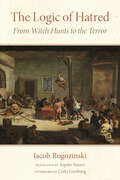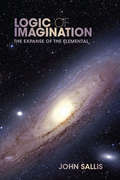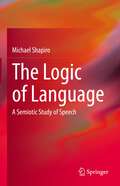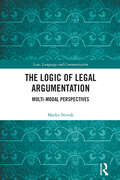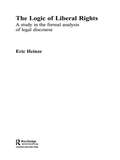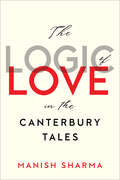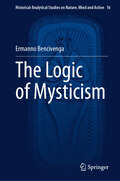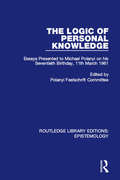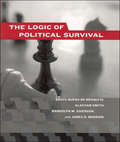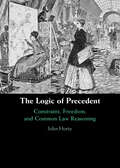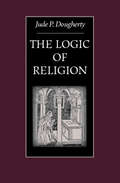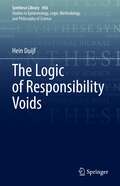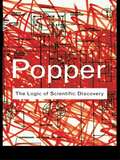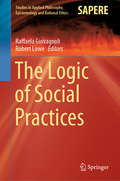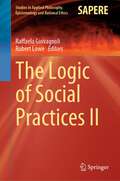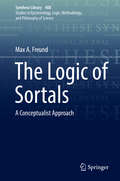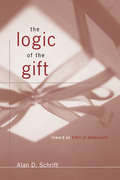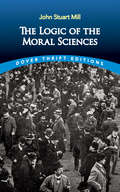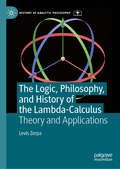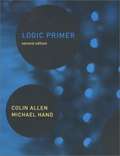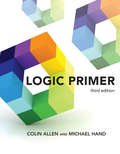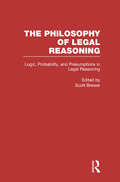- Table View
- List View
The Logic of Hatred: From Witch Hunts to the Terror
by Jacob RogozinskiThis book works to uncover the logic of hatred, to understand how this affect manifests itself historically in persecution and terror apparatuses. More than a historical genealogy of persecution, The Logic of Hatred shows what phenomenology can offer to historical understanding. Focusing on the witch-hunts waged in the fifteenth through seventeenth centuries, the first part of the book analyzes the techniques instigators used to designate and annihilate their targets: the search for diabolical stigma, the confession of “truth” extracted by torture, the constitution of an absolute Enemy through the suggestion of conspiracy, of a world turned upside-down, or the figure of Satan.Rogozinski locates one of the origins of the witch-hunt in the anguish that popular uprisings arouse in dominant classes. The second part of the book extends the investigation to related phenomena, such as the extermination of lepers in the Middle Ages and the Reign of Terror during the French Revolution. By studying these historical experiences and marking their differences and similarities, this book shows the passage from exclusion to persecution and how revolts of the oppressed can let themselves be transformed and captured by persecutory politics. The analyses presented thus shed light on conspiracy theory and the terror apparatuses of our time.
Logic of Imagination
by John SallisThe Shakespearean image of a tempest and its aftermath forms the beginning as well as a major guiding thread of Logic of Imagination. Moving beyond the horizons of his earlier work, Force of Imagination, John Sallis sets out to unsettle the traditional conception of logic, to mark its limits, and, beyond these limits, to launch another, exorbitant logic--a logic of imagination. Drawing on a vast range of sources, including Plato, Aristotle, Kant, Hegel, Nietzsche, and Freud, as well as developments in modern logic and modern mathematics, Sallis shows how a logic of imagination can disclose the most elemental dimensions of nature and of human existence and how, through dialogue with contemporary astrophysics, it can reopen the project of a philosophical cosmology.
The Logic Of Infinity
by Barnaby SheppardFew mathematical results capture the imagination like Georg Cantor's groundbreaking work on infinity in the late nineteenth century. This opened the door to an intricate axiomatic theory of sets which was born in the decades that followed. Written for the motivated novice, this book provides an overview of key ideas in set theory, bridging the gap between technical accounts of mathematical foundations and popular accounts of logic. Readers will learn of the formal construction of the classical number systems, from the natural numbers to the real numbers and beyond, and see how set theory has evolved to analyse such deep questions as the status of the continuum hypothesis and the axiom of choice. Remarks and digressions introduce the reader to some of the philosophical aspects of the subject and to adjacent mathematical topics. The rich, annotated bibliography encourages the dedicated reader to delve into what is now a vast literature.
The Logic of Language: A Semiotic Study of Speech
by Michael ShapiroThis book serves as a basis for the exploration of language in a more systematic way. By surveying the several major divisions of language (phonology, morphology, syntax, lexis, tropology) and explicating the way in which sound and meaning cohere in them, this text lays bare––for students, scholars and advanced readers alike––the lineaments of an understanding of what makes language the sign system par excellence, in the service of its most important function as the instrument of cognition and of communication. This book is intended as a companion volume to Shapiro’s The Speaking Self: Language Lore and English Usage. The two volumes taken in tandem will provide a solid grounding in the observational science of linguistics, linking theory with practice in a way that will expand one’s understanding of language as a global phenomenon.
The Logic of Legal Argumentation: Multi-Modal Perspectives (Law, Language and Communication)
by Marko NovakMulti-modal argumentation with its logical, emotional, visceral and kisceral arguments is an important addition to logical argumentation, especially when real-life situations are considered. It does not discard logic but adds other modes of argumentation to complement it, to emphasize the realistic environments of communication. In this sense, the multi-modal theory is important for the area of legal argumentation, where even in the reasoning of judicial decisions traces of a flesh-and-blood personality, who decided the case and wrote the reasons, can be found. This book presents a comprehensive analysis of this informal logic in legal argumentation and its practicality within the law. It argues that by building on the dialectical and rhetorical models of legal argument, the former being important for clear cases while the latter for unclear ones, the multi-modal theory of legal argumentation brings together logic and psychology in a holistic or integral perspective. The approach is not only descriptive, identifying the traces of alternate arguments in judicial decisions, but is also normative, presenting the criteria for evaluation that multi-modal arguments need to face to attain validity in the legal context. The work will be of interest to academics and researchers in the areas of Legal Theory, Legal Linguistics, Philosophy of Law, and Communication Studies.
The Logic of Liberal Rights: A Study in the Formal Analysis of Legal Discourse (Routledge Studies in Twentieth-Century Philosophy #No.14)
by Eric HeinzeThe Logic of Liberal Rights uses basic logic to develop a model of argument presupposed in all disputes about civil rights and liberties. No prior training in logic is required, as each step is explained. This analysis does not merely apply general logic to legal arguments but is also specifically tailored to the issues of civil rights and liberties. It shows that all arguments about civil rights and liberties presuppose one fixed structure and that there can be no original argument in rights disputes, except within the confines of that structure. Concepts arising in disputes about rights, like 'liberal' or 'democratic', are not mere abstractions but have a fixed and precise character.This book integrates themes in legal theory, political science and moral philosophy, as well as the philosophy of logic and language. For the advanced scholar, the book provides a model presupposed by leading theoretical schools (liberal and critical, positivist and naturalist). For the student it provides a systematic theory of civil rights and liberties. Examples are drawn from the European Convention in Human Rights but no special knowledge of the Convention is assumed, as the issues analysed arise throughout the world. Such issues include problems of free speech, religious freedom, privacy, torture, unlawful detention and private property.
The Logic of Love in the Canterbury Tales
by Manish SharmaThe Logic of Love in The Canterbury Tales argues that Geoffrey Chaucer’s magnum opus draws inventively on the resources of late medieval logic to conceive of love as an "insoluble." Philosophers of the fourteenth century expended great effort to solve insolubilia, like the notorious Liar paradox, in order to decide upon their truth or falsity. For Chaucer, however, and in keeping with Christ’s admonition from the Sermon on the Mount, the lover does not judge – does not decide on – the beloved. Through a series of detailed and rigorously "non-judgmental" readings, Manish Sharma provides new insight into each of the prologues and tales and intervenes into scholarly debates about their collective import. In so doing, The Logic of Love in The Canterbury Tales deploys Chaucer’s understanding of charity to consider the limitations of modern critical approaches to The Canterbury Tales, including deconstruction, psychoanalysis, and gender theory. In the course of the analysis, Sharma shows not only how love and medieval philosophy together inform Chaucerian composition, but also how Chaucer could serve as a resource for contemporary theoretical reflections on love and ethics.
The Logic of Mysticism (Historical-Analytical Studies on Nature, Mind and Action #16)
by Ermanno BencivengaThis book reconciles the worlds of mysticism and logic, building on the author’s previous groundbreaking work in oceanic logic. Historically, the seemingly distinct domains of mysticism and logic have been viewed through a narrow lens through which logic and mysticism have been considered fundamentally separate from each other. The author expands on this concept and argues that logic can be understood in a broader sense. The book reveals that mystics engage in rigorous reasoning, and their writings provide fertile ground for the advancement of logical discourse. The text references insights from the fifth century B.C. through the Middle Ages to the present day, offering a compelling argument for the harmonious integration of logic and mysticism. It challenges conventional wisdom and opens new avenues for understanding the depths of human thought, making it of great interest to those interested in philosophical logic as well as history of science.
The Logic of Personal Knowledge: Essays Presented to M. Polanyi on his Seventieth Birthday, 11th March, 1961 (Routledge Library Editions: Epistemology)
by POLANYI FESTSCHRIFT COMMITTEEOriginally published in 1961. Michael Polanyi was a polymath who influenced economics and the sciences as well as philosophy. His wide-ranging research in physical science is as well-known as his work on freedom and knowledge and his arguments against positivism and reductionism. This collection of essays written for him touches on all aspects of his influence but rotates around his published lectures Personal Knowledge: Towards a Post-Critical Philosophy. The contributors address four areas – The Scientist as Knower, Historical Perspectives, The Knowledge of Society and the Knowledge of Living Things.
The Logic of Political Survival (The\mit Press Ser.)
by Bruce Bueno De Mesquita Alastair Smith Randolph M. Siverson James D. MorrowThe authors of this ambitious book address a fundamental political question: why are leaders who produce peace and prosperity turned out of office while those who preside over corruption, war, and misery endure? Considering this political puzzle, they also answer the related economic question of why some countries experience successful economic development and others do not. The authors construct a provocative theory on the selection of leaders and present specific formal models from which their central claims can be deduced. They show how political leaders allocate resources and how institutions for selecting leaders create incentives for leaders to pursue good and bad public policy. They also extend the model to explain the consequences of war on political survival. Throughout the book, they provide illustrations from history, ranging from ancient Sparta to Vichy France, and test the model against statistics gathered from cross-national data. The authors explain the political intuition underlying their theory in nontechnical language, reserving formal proofs for chapter appendixes. They conclude by presenting policy prescriptions based on what has been demonstrated theoretically and empirically.
The Logic of Precedent: Constraint, Freedom, and Common Law Reasoning
by John HortyUnlike statutory law, which relies on the explicit formulation of rules, common law is thought to emerge from a complex doctrine of precedential constraint, according to which decisions in earlier cases constrain later courts while still allowing these courts the freedom to address new situations in creative ways. Although this doctrine is applied by legal practitioners on a daily basis, it has proved to be considerably more difficult to develop an adequate theoretical account of the doctrine itself. Drawing on recent work in legal theory, as well as AI and law, this book develops a new account of precedential constraint and the balance achieved in the common law between constraint and freedom. This account, which involves construction of a group priority ordering among reasons, is then applied to other topics including the semantics of open-textured predicates and the practice of making exceptions to general rules.
The Logic of Real Arguments
by Alec FisherThis book aims to help college students to think critically about the kind of sustained, theoretical arguments which they commonly encounter in the course of their studies: arguments about the natural world, about society, about policy, about philosophy, and so on. The book expounds a novel method for handling such arguments and applies to reasoning expressed in natural language - has two distinctive features. It employs what is called the 'Assertibility Question', a key question in extracting and evaluating arguments, and it deals fully with the technique of 'suppositional reasoning', an important method of reasoning which is commonly ignored by writers in this field. The author applies the method to examples from a wide variety of sources. These range from newspaper articles to extracts from classic texts. There is a special chapter on scientific method and an appendix which explains some classical formal logic (a 'little light logic'). The book contains numerous exercises and concludes with carefully selected passages on which students can practise their critical thinking skills.
The Logic of Religion
by Jude P. DoughertyThe philosopher and author of Western Creed, Western Identity offers a probing history of important writings on the logic of religion. The Logic of Religion offers a sweeping history of philosophical perspectives on religion from ancient Greek and Roman writings to medieval Christian thought to modern Western philosophy and beyond. Even among those who find no evidence for the existence of God, such as Karl Marx and Sigmund Freud, we encounter discussions of the nature of religion and its function in society. This study begins in antiquity with Socrates, Plato, Cicero, and Seneca. It then moves through Augustine to the Middle Ages as represented by Averroes and Aquinas. By so proceeding, philosopher Jude P. Dougherty gives the reader insight into the logic of religion as conceived before and after the advent of Christianity. Subsequent investigation leads to the works of David Hume, Immanuel Kant, and G. W. F. Hegel, each of whom spoke to the implications of religion in the practical order, and of Sigmund Freud&’s negative assessment of religion in The Future of an Illusion. Although the focus of this study is primarily Western religion, attention is also paid to certain Eastern modes of thought such as Buddhism and Confucianism. Throughout, readers will find many interesting philosophical observations of the nature of belief, worship, ritual, sacrifice, doctrine, theology, and community.
The Logic of Responsibility Voids (Synthese Library #456)
by Hein DuijfThis book focuses on the problem of responsibility voids: these are cases where responsibility for a morally undesirable outcome cannot be attributed to any of the involved agents. Responsibility voids are thought to occur in collective decision-making and in the context of artificial intelligent systems. In these cases, philosophers worry that there is a shortfall of moral responsibility. In particular, such voids are often assumed to justify a notion of collective responsibility that cannot be reduced to individual responsibility. One of the aims of the book is to study how collective responsibility and joint action relate to individual responsibility and individual actions. The book offers a unifying framework for modelling moral responsibility by drawing from modal logic and game theory.The book investigates the possibility and scope of the problem of responsibility voids. One of its characteristics is its pluralistic perspective on moral responsibility: in contrast to giving a unique and all-encompassing definition of it, the book makes progress by spelling out and modelling several conceptions of moral responsibility. One of the appealing features of the book is that a relatively small range of models is used to investigate a variety of conceptions of moral responsibility. The unifying framework can thus be used to characterize the conditions under which responsibility voids are ruled out.
The Logic of Scientific Discovery: 14th Printing (Routledge Classics)
by Karl PopperDescribed by the philosopher A.J. Ayer as a work of 'great originality and power', this book revolutionized contemporary thinking on science and knowledge. Ideas such as the now legendary doctrine of 'falsificationism' electrified the scientific community, influencing even working scientists, as well as post-war philosophy. This astonishing work ranks alongside The Open Society and Its Enemies as one of Popper's most enduring books and contains insights and arguments that demand to be read to this day.
The Logic of Social Practices (Studies in Applied Philosophy, Epistemology and Rational Ethics #52)
by Raffaela Giovagnoli Robert LoweThis book reports on cutting-edge research concerning social practices. Merging perspectives from various disciplines, including philosophy, biology, and cognitive science, it discusses theoretical aspects of social behavior along with models to investigate them, and also presents key case studies. Further, It describes concepts related to habits, routines, and rituals and examines important features of human action, such as intentionality and choice, exploring the influence of specific social practices in different situations. Based on a workshop held in June 2018 at the 6th World Congress of Universal Logic, UNILOG2018, in Vichy, and including additional invited chapters, the book offers fresh insights into the fields of social practice and the cognitive, computational, and philosophical tools to understand them.
The Logic of Social Practices II (Studies in Applied Philosophy, Epistemology and Rational Ethics #68)
by Raffaela Giovagnoli Robert LoweThis book reports on cutting-edge research concerning social practices. Merging perspectives from various disciplines, including philosophy, biology, psychology and cognitive science, and economy, it discusses theoretical aspects of social behavior along with models to investigate them, and presenting key case studies as well. Further, it describes concepts related to habits, routines, and rituals and examines important features of human action, such as intentionality and choice, exploring the influence of specific social practices in different situations. Based on a workshop held on April 2022 at the World Congress on Universal Logic (UNILOG 22), in Crete, and including additional invited chapters, the book offers fresh insights into the fields of social practice and the cognitive, computational, and philosophical tools to understand them.
The Logic of Sortals: A Conceptualist Approach (Synthese Library #408)
by Max A. FreundSortal concepts are at the center of certain logical discussions and have played a significant role in solutions to particular problems in philosophy. Apart from logic and philosophy, the study of sortal concepts has found its place in specific fields of psychology, such as the theory of infant cognitive development and the theory of human perception. In this monograph, different formal logics for sortal concepts and sortal-related logical notions (such as sortal identity and first-order sortal quantification) are characterized. Most of these logics are intensional in nature and possess, in addition, a bidimensional character. That is, they simultaneously represent two different logical dimensions. In most cases, the dimensions are those of time and natural necessity, and, in other cases, those of time and epistemic necessity. Another feature of the logics in question concerns second-order quantification over sortal concepts, a logical notion that is also represented in the logics. Some of the logics adopt a constant domain interpretation, others a varying domain interpretation of such quantification. Two of the above bidimensional logics are philosophically grounded on predication sortalism, that is, on the philosophical view that predication necessarily requires sortal concepts. Another bidimensional logic constitutes a logic for complex sortal predicates. These three sorts of logics are among the important novelties of this work since logics with similar features have not been developed up to now, and they might be instrumental for the solution of philosophically significant problems regarding sortal predicates. The book assumes a modern variant of conceptualism as a philosophical background. For this reason, the approach to sortal predicates is in terms of sortal concepts. Concepts, in general, are here understood as intersubjective realizable cognitive capacities. The proper features of sortal concepts are determined by an analysis of the main features of sortal predicates. Posterior to this analysis, the sortal-related logical notions represented in the above logics are discussed. There is also a discussion on the extent to which the set-theoretic formal semantic systems of the book capture different aspects of the conceptualist approach to sortals. These different semantic frameworks are also related to realist and nominalist approaches to sortal predicates, and possible modifications to them are considered that might represent those alternative approaches.
The Logic of the Gift: Toward an Ethic of Generosity
by Alan D. SchriftThe theme of the gift can be located at the center of current discussions of deconstruction, gender and feminist theory, ethics, philosophy, anthropology, and economics: it is, simply, one of the primary focal points at which contemporary interdisciplinary discourses intersect. Into this context comes a new, indispensable volume. The Logic of the Gift offers several important essays on gifts and gift-giving that are often referred to but seldom read, and adds to them new essays written especially for this collection.
The Logic of the Moral Sciences (Dover Thrift Editions)
by John Stuart MillJohn Stuart Mill (1806–73) was the most influential English philosopher of the nineteenth century. His vast intellectual output covered a range of subjects — traditional philosophy and logic, economics, political science — and included this work, a founding document in the area now known as social science. In The Logic of the Moral Sciences, Mill applied his considerable talents to examining how the study of human behavior, society, and history could be established on a rational, philosophical basis. The philosopher maintains that casual empiricism and direct experiment are not applicable to the study of complex social phenomena. Instead, "empirical laws," drawn from historical generalizations, must be derivable from a deductive science of human nature. Mills' insights and approaches have remained relevant in the century and a half since this treatise's publication. This volume will prove of vital interest to historians of philosophy and the social sciences as well as to undergraduate social science majors.
The Logic, Philosophy, and History of the Lambda-Calculus: Theory and Applications (History of Analytic Philosophy)
by Levis ZerpaThis is the first book focused on the logico-philosophical aspects of the lambda-calculus since the inception of the field in 1932 in the pioneering work of Alonzo Church. The book starts a new field called “lambda-philosophy”: a branch of logic-based analytic philosophy in the tradition of Frege and Russell, directly constructed from the lambda-calculus. Another innovation of the book is a new graphical and intuitive logico-mathematical notation for the lambda-calculus called “the container notation”. The book covers in detail some episodes of the history of the subject, including three comparative studies of the lambda-calculus with Viète's algebra, Descartes' analytic geometry, and Wittgenstein’s Tractatus. A didactic approach to the logico-mathematical aspects of the lambda-calculus, partially based on cognitive science, provides the technical basis for the analysis. In this way, the book provides a systematic and coherent treatment of diverse logico-philosophical aspects and applications of the lambda-calculus as part of the platform offered by lambda-philosophy. The book includes the following: a detailed treatment of the ambiguities of the concept of function (under the traditional or Euler’s notation); an elucidation of the notion of transformative philosophical analysis; an account of Church’s methodology which shows that the lambda-calculus is an adequate solution to the problem of a philosophical analysis of functions as rules of computation; a didactic treatment of the formal aspects of the lambda-calculus through the container notation; and diverse arithmetical and logical examples of the container notation. The book questions a dogma of algorithmic thinking by arguing that the lambda-calculus is more intuitive and natural than Turing machines. The Logic, Philosophy, and History of the Lambda-Calculus is essential reading for all scholars and researchers of the history of analytic philosophy and especially those focussing on logic-based analytic philosophy.
Logic Primer
by Colin Allen Michael Hand<P>Logic Primer presents a rigorous introduction to natural deduction systems of sentential and first-order logic.<P> The text is designed to foster the student-instructor relationship. <P>The key concepts are laid out in concise definitions and comments, with the expectation that the instructor will elaborate upon them. <P>New to the second edition is the addition of material on the logic of identity in chapters 3 and 4.<P> An innovative interactive Web site, consisting of a "Logic Daemon" and a "Quizmaster," encourages students to formulate their own proofs and links them to appropriate explanations in the book.
Logic Primer, third edition
by Colin Allen Michael HandThe new edition of a comprehensive and rigorous but concise introduction to symbolic logic.Logic Primer offers a comprehensive and rigorous introduction to symbolic logic, providing concise definitions of key concepts, illustrative examples, and exercises. After presenting the definitions of validity and soundness, the book goes on to introduce a formal language, proof theory, and formal semantics for sentential logic (chapters 1–3) and for first-order predicate logic (chapters 4–6) with identity (chapter 7). For this third edition, the material has been reorganized from four chapters into seven, increasing the modularity of the text and enabling teachers to choose alternative paths through the book. New exercises have been added, and all exercises are now arranged to support students moving from easier to harder problems. Its spare and elegant treatment makes Logic Primer unique among textbooks. It presents the material with minimal chattiness, allowing students to proceed more directly from topic to topic and leaving instructors free to cover the subject matter in the way that best suits their students. The book includes more than thirty exercise sets, with answers to many of them provided in an appendix. The book&’s website allows students to enter and check proofs, truth tables, and other exercises interactively.
Logic, Probability, and Presumptions in Legal Reasoning: A Collection Of Essays By Philosophers And Legal Scholars: Logic, Probability, And Presumptions In Legal Reasoning (Philosophy of Legal Reasoning: A Collection of Essays by Philosophers and Legal Scholars #No. 1)
by Scott BrewerAt least since plato and Aristotle, thinkers have pondered the relationship between philosophical arguments and the "sophistical" arguments offered by the Sophists -- who were the first professional lawyers. Judges wield substantial political power, and the justifications they offer for their decisions are a vital means by which citizens can assess the legitimacy of how that power is exercised. However, to evaluate judicial justifications requires close attention to the method of reasoning behind decisions. This new collection illuminates and explains the political and moral importance in justifying the exercise of judicial power.
